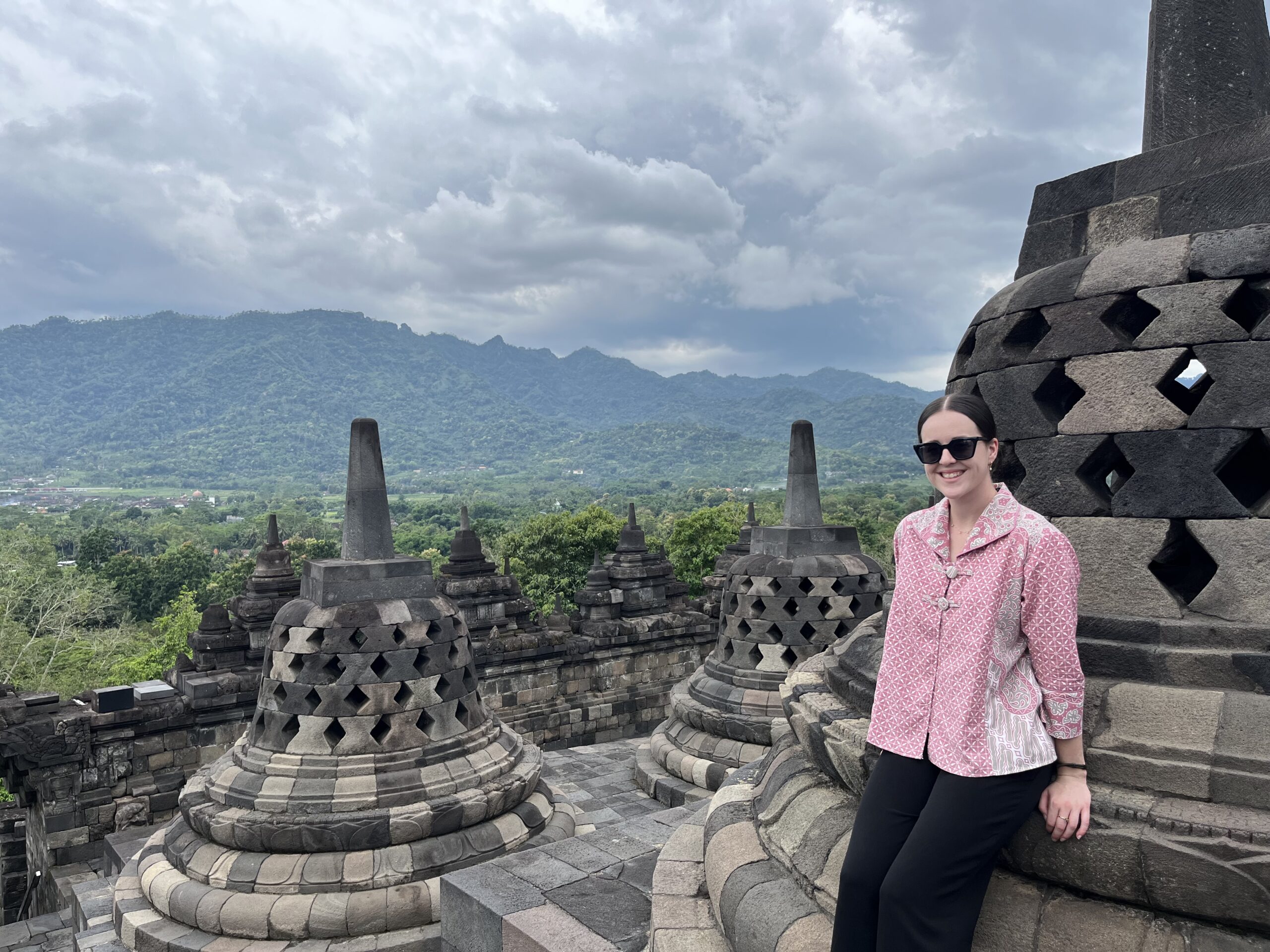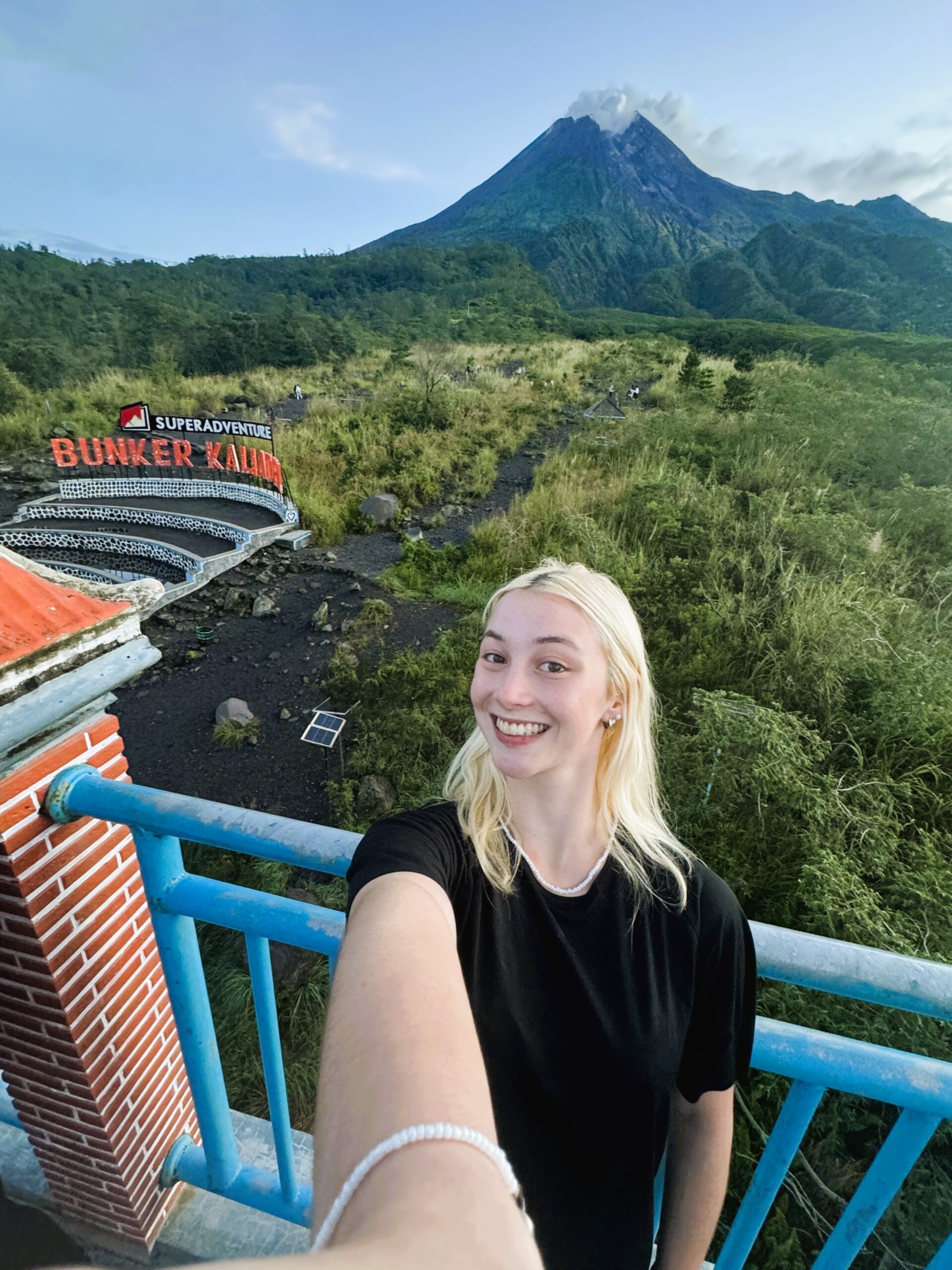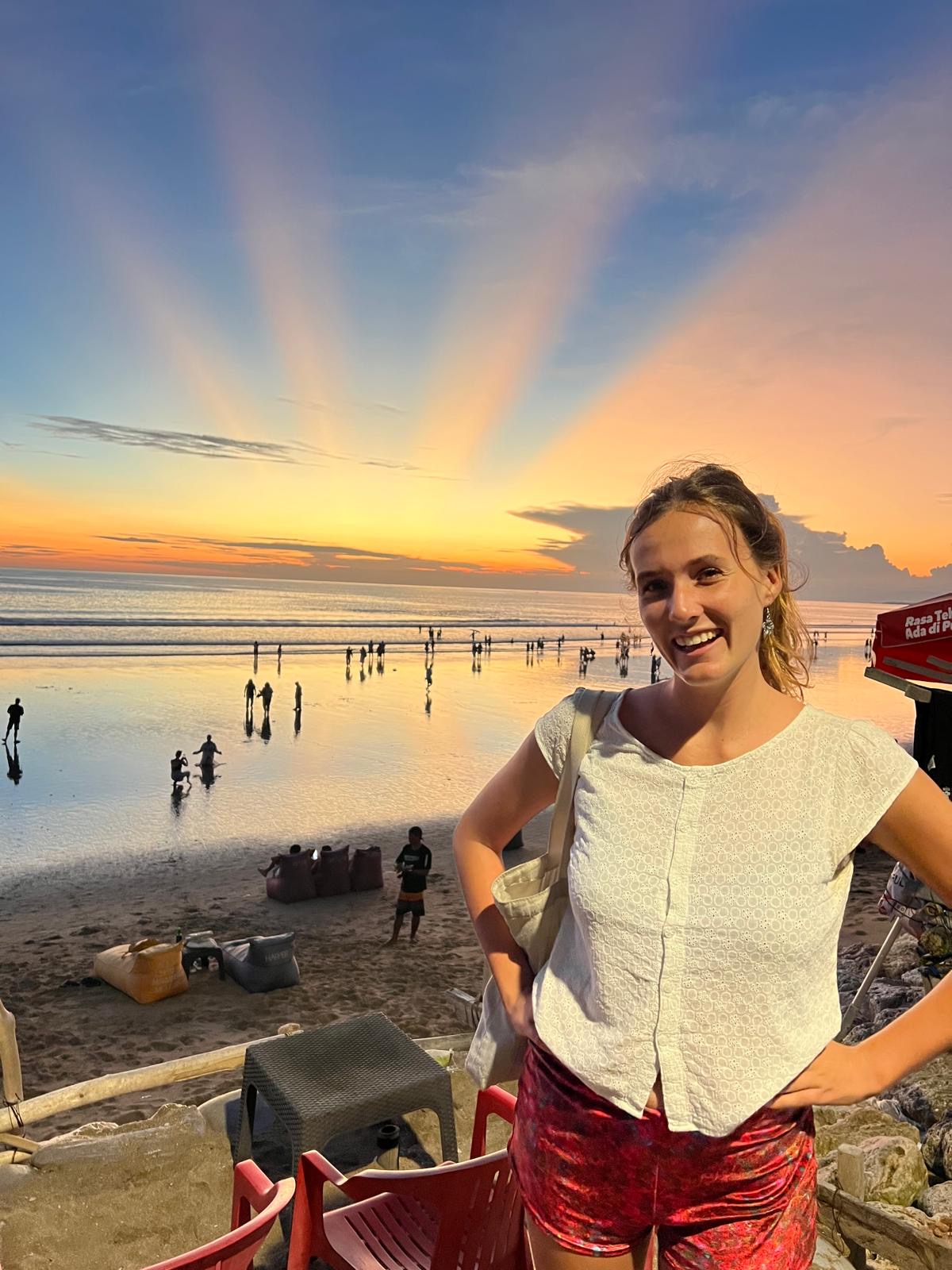Clare Taylor was a participant of the Development Studies Professional Practicum (DSPP), in 2025. Clare is studying at Murdoch University.
Q: Why did you decide to undertake the Acicis internship program?
As an aspiring humanitarian aid worker, the Acicis program provided me with an opportunity to integrate my academic knowledge with real-life experience working in-country. Acicis’s focus on cultural immersion allowed me to engage with various aspects of Indonesian culture and build lasting connections with locals. These are all valuable experiences and skills that I can apply to my future career.
Q: Did you receive a New Colombo Plan Mobility Grant? Do you think the NCP is an important initiative? If yes, why?
The NCP grant was extremely helpful in covering the majority of my tuition fees. I believe the NCP is an important initiative as it encourages Australian students to step into the global community and build connections that foster greater interconnection and cooperation. The NCP provides young Australians—who might not otherwise have the financial means—the opportunity to engage with young Indonesians and apply their academic knowledge in real-world settings.
Q: Where did you live in Indonesia (Kos, homestay, hotel, rental etc.)? Any tips for prospective students on finding accommodation?
My placement was in Yogyakarta, so I didn’t have the opportunity to check out accommodation options in person during the first week like the students placed in Jakarta. Fortunately, a couple of incredible local students helped me select suitable accommodation. I chose to stay in an Airbnb in Sleman, Yogyakarta. Sleman is a great area in the north of Yogyakarta, with plenty of restaurants and cafés, not to mention an amazing view of Merapi! Although it was slightly pricier than the accommodation some of my fellow students chose (staying in a kos, sharehouse, ect.), I felt it was well worth the cost, as I was comfortable and safe throughout my stay.
My hot tip would be to ask your LOs for help—they are all extremely supportive and friendly!
Q: How have you found the academic components of this program – i.e. the language classes/seminars?
I absolutely loved the language classes! Shoutout to Ibu Ima, who always greeted us with a smile and made every class engaging, fun, and informative. I felt I learned a lot in just a short period of time. Without the language classes, everyday tasks such as ordering food and navigating transportation would have been significantly more difficult.
The seminars also provided a strong foundation for understanding Indonesian culture and the development context. We learned about current issues, key barriers, and the ways local organizations are working to address development challenges. I found these seminars to be an excellent source of information, helping me grasp the development landscape before beginning my internship with an NGO.
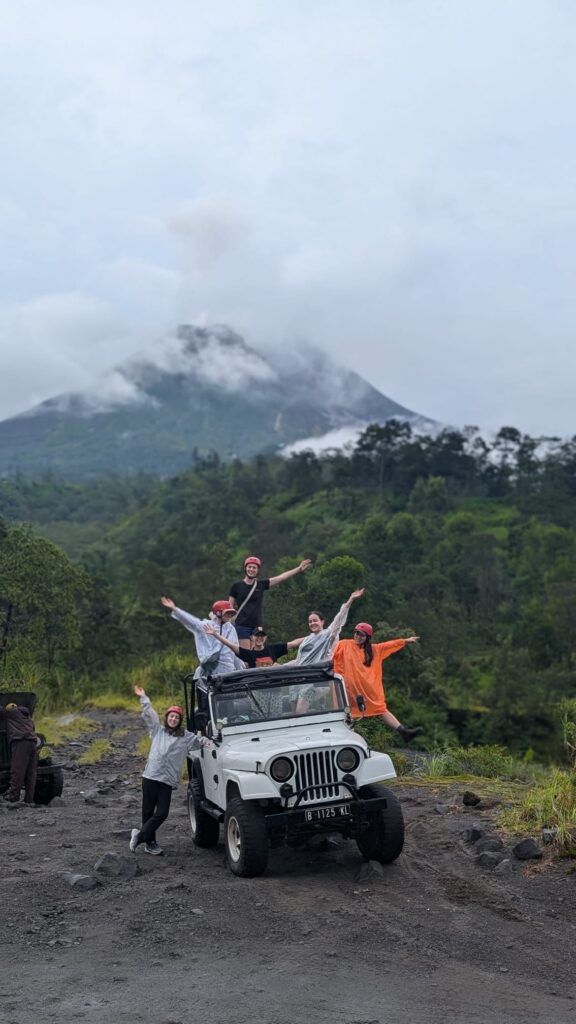
Q: What organisation are you interning with? (Explain your role and responsibilities)
I interned with RedR Indonesia in Yogyakarta, a humanitarian agency dedicated to improving international emergency relief. RedR focuses on delivering training and support to various stakeholders to enhance disaster preparedness and mitigate the impact on all members of the community.
My primary task was to create training flyers to promote the courses that RedR offers. All the information for these flyers was in Bahasa Indonesia, and the final product needed to be in Indonesian as well. While the two-week language course couldn’t fully prepare me for this, it wasn’t stressful in the slightest—both my mentors and student LOs were more than willing to assist me.
My mentors, Benny and Adhong, were incredibly supportive and knowledgeable, treating me with the utmost respect. They had a wealth of experience, which they eagerly shared, and were always willing to assist me in any way they could. They emphasized that my role during the internship was to learn as much as possible and get involved in any aspect I felt comfortable with. Ultimately, what I gained from this internship was up to me.
Q: How have you found the work culture of your host organisation? How is it different to work experience in Australia?
I can’t praise my host organization enough! Although RedR is a small team, every member is incredibly passionate and dedicated to helping their communities. I don’t think I’ve ever met people who are more hardworking, passionate, and welcoming than my mentors.
My experience with RedR was quite different from my work experience in Australia. The staff were not only incredibly friendly and inviting but also genuinely interested in engaging in conversations with me, rather than just talking at me. The organization felt more like a family than a workplace. I was even invited to a team meeting at the director’s house, where we were welcomed with a home-cooked meal and treated as equals rather than just employees.
Q: What are the main skills you have learnt during your internship?
On my first day with RedR, I learned one of the most important pieces of information I will carry throughout my career—the Sphere Handbook. I was shocked that I hadn’t come across it sooner, as it is often referred to as the “humanitarian bible.” This experience reinforced the value of in-country learning and the importance of gaining knowledge beyond the classroom.
During my internship, I also learned how to communicate with people despite a language barrier. On my second day with RedR, I attended a full-day workshop with YUE, delivered entirely in Indonesian. This was quite confronting, as my level of Bahasa Indonesia wasn’t advanced enough to fully understand what was being said. Despite this, I was able to participate in activities and grasp key aspects of the content—an essential skill for any international humanitarian professional.
My internship also gave me the opportunity to engage with a wide range of people, including government officials, local community members, and representatives from other NGOs. This experience was invaluable, as it closely mirrors the kind of work I will likely do as a humanitarian worker.
Q: What did you find to be the most rewarding part of this experience?
The most rewarding part of the Acicis program was the connections I made and my immersion into Indonesian culture. Acicis encourages participants to connect with locals and experience community life, which I found incredibly fulfilling. Through this, I made lasting friendships and gained a deeper understanding of Indonesian culture, which will undoubtedly benefit me in my future career.
During my time in Indonesia, I learned how to communicate with a diverse range of people, and I was struck by how different their way of life was from mine. This experience made me reflect on how fortunate we are in Australia, and it deepened my appreciation for the privileges we often take for granted.
It was evident that Acicis carefully considered my background and placed me with an organization that aligned with my career aspirations and preferences. My placement was rewarding in so many ways, but above all, it gave me a real glimpse into what working in the field would be like—an experience that classroom teaching simply can’t offer.
Q: Were you able to learn about the Indonesian culture from this program? If yes, how was this achieved?
I gained a lot of insight into Indonesian culture through the seminars and guest speakers. Taking the time to ask questions and listen in both formal and informal settings allowed me to learn about Indonesian culture from various perspectives. Additionally, activities like participating in a batik-making class and visiting a dog shelter provided me with a deeper understanding of different cultural aspects of Indonesia.
Acicis encouraged us to say yes to as many experiences and opportunities as possible, even if they were outside our comfort zone. I definitely felt that this was the most influential way to immerse myself in Indonesian culture.
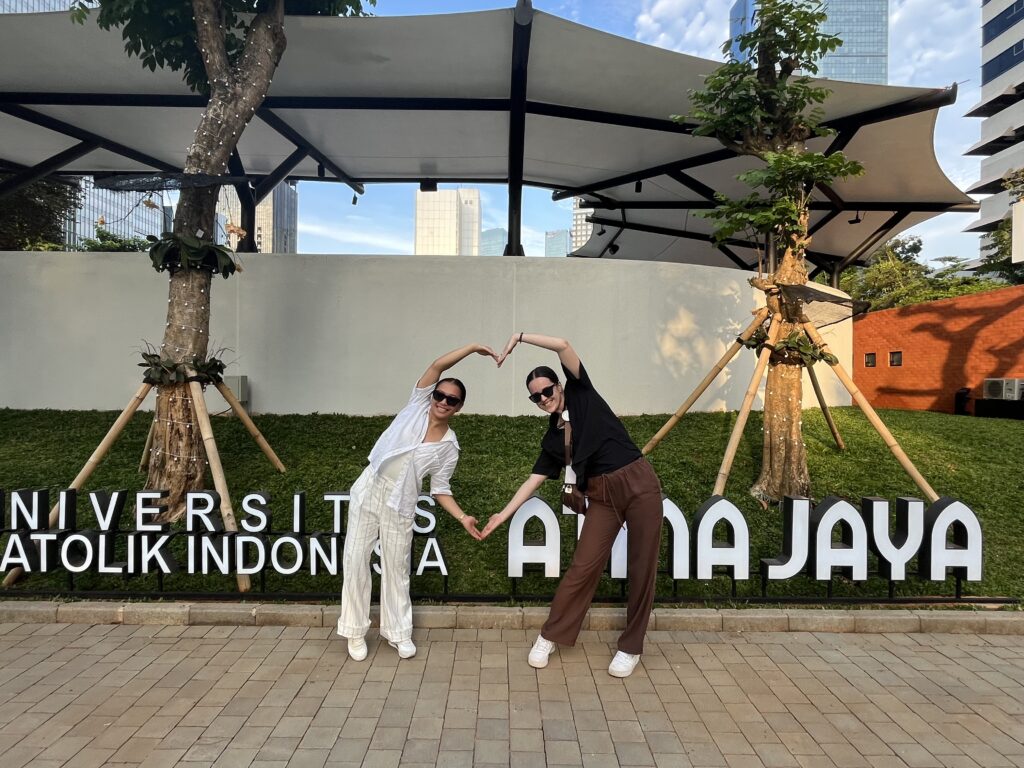
Q: How will the internship benefit or influence your future career?
I would argue that I learned more about humanitarian aid through this internship than I have through my degree. My host organisation was incredible and encouraged me to make as many connections as possible, setting up meetings with national facilitators of disaster management, local community members directly impacted by disasters, and government officials. They introduced me to the Sphere Handbook, which, as I mentioned, is often referred to as the “humanitarian bible.” They also shared personal experiences of working in the field and what it takes to do this kind of work. These are just a few examples of what I learned and how my internship is likely to benefit my future career.
Q: Would you recommend this program to your friends?
I would absolutely recommend the Acicis program to my friends, as I believe it provided me with invaluable experiences and skills that I will use not only in my future career but also in my personal life. I am a strong believer in learning by doing and getting out into the world to put academic knowledge into practice, which is what this program promotes.
Q: Favourite Indonesian word/phrase:
My favourite phrase was also my most used phrase. Saya berbicara bahasa Indonesia sedikit. Sedikit being the key word!
Q: What did you get up to in your free-time? i.e. in the evenings and on weekends.
One of my favourite experiences was visiting a dog shelter in Yogyakarta. Shelter Fortune Life cares for over 70 dogs rescued from the streets or the meat trade. The owner, Jean, and her two volunteers do a phenomenal job providing excellent care for these dogs. The owner was so thrilled that we came, she even took us out to lunch! If you love dogs as much as I do I would defiantly encourage you to take a trip to the shelter and support this incredible organisation. As someone who loves adventure, I couldn’t miss the chance to do a jeep and quad bike tour through the jungle surrounding Merapi Volcano—an absolute must if you’re in Yogyakarta. I also visited a number of temples, including Borobudur and Prambanan, as well as the lesser-known Chicken Church! Another must-do if you find yourself in Yogyakarta. I highly recommend doing the structural tour of Borobudur Temple, as the scenery is utterly breathtaking. You’ll also get incredible views from the crown of the Chicken Church!
Q: What surprised you about Indonesia? Any new insights?
I was surprised by how comfortable and safe I felt the entire time. All the locals were incredibly friendly, and everyone was willing to assist in any way they could—whether that was a teacher, colleague, or even a random person on the street.
